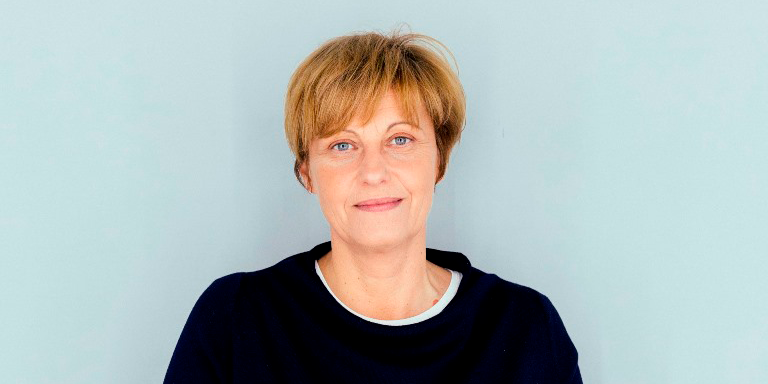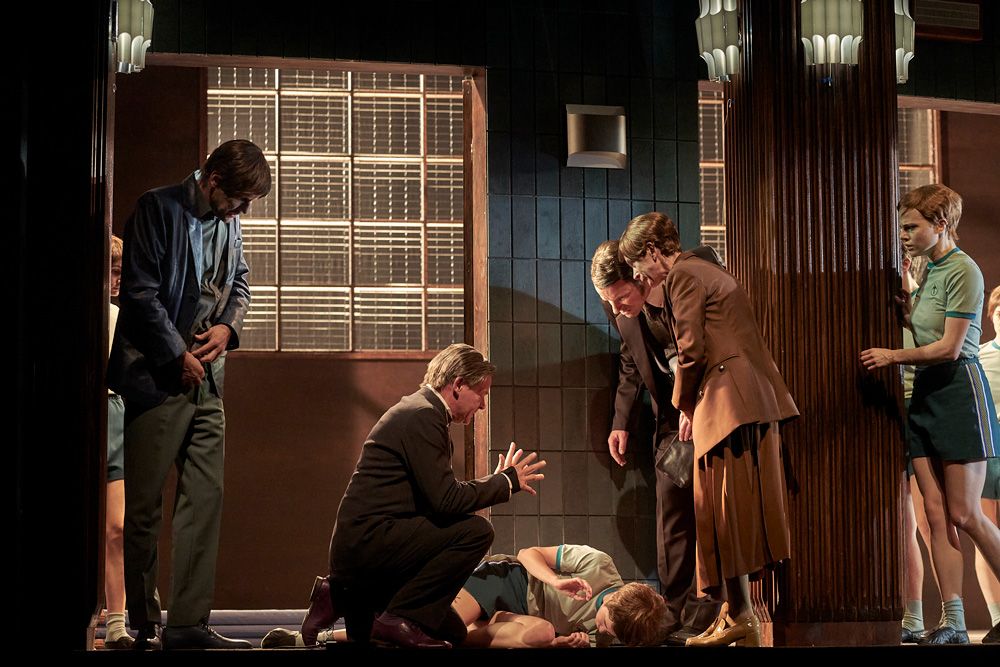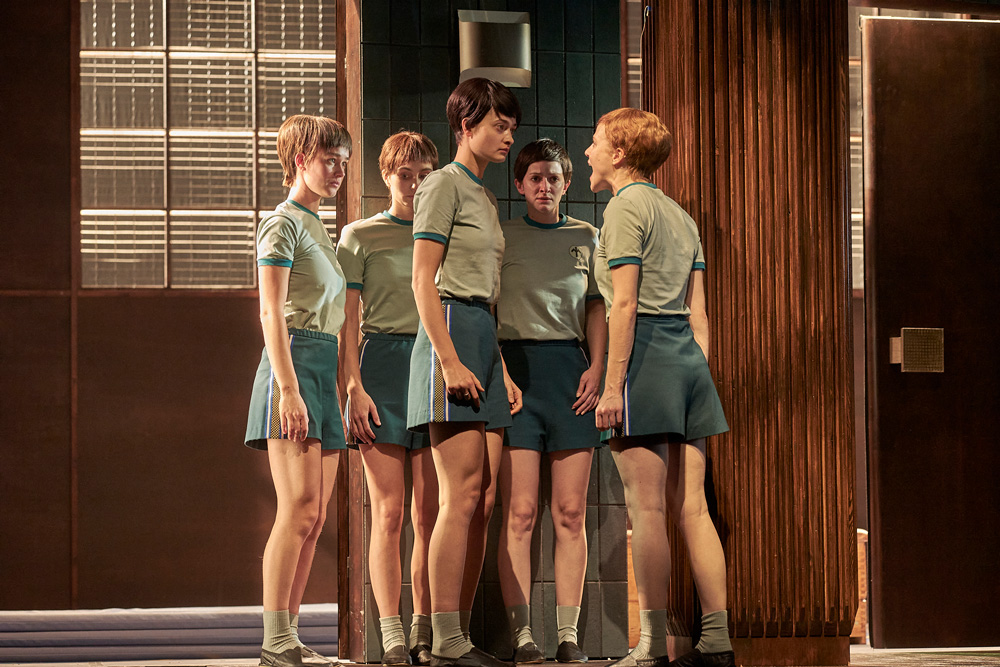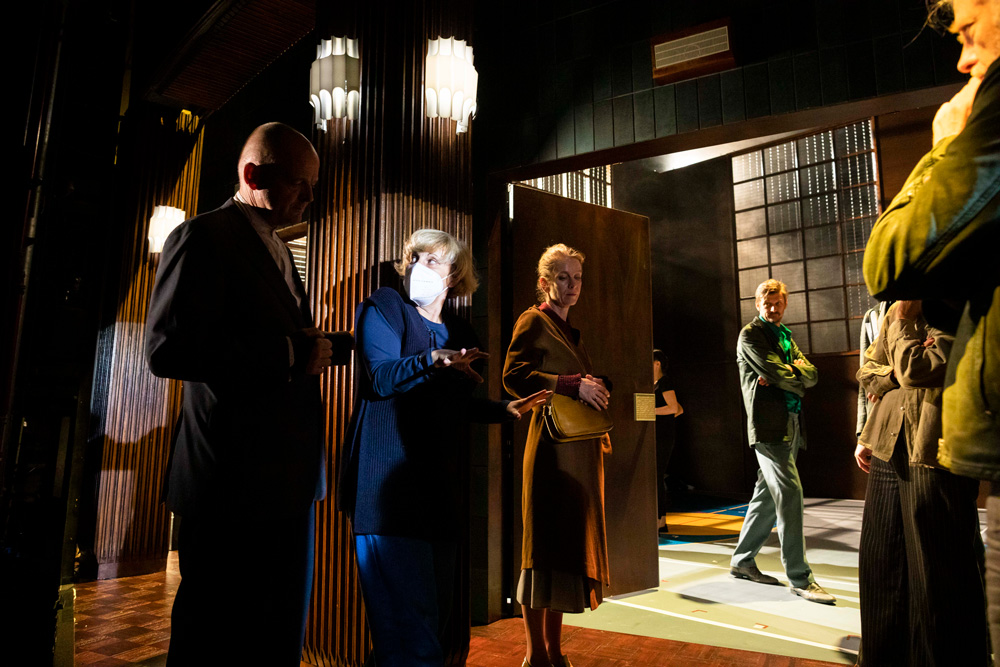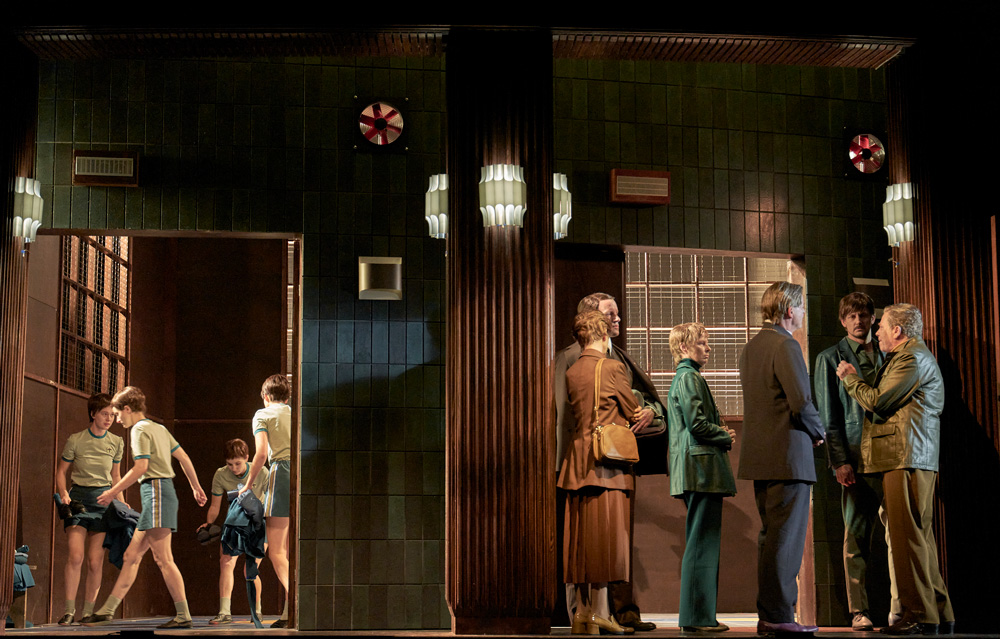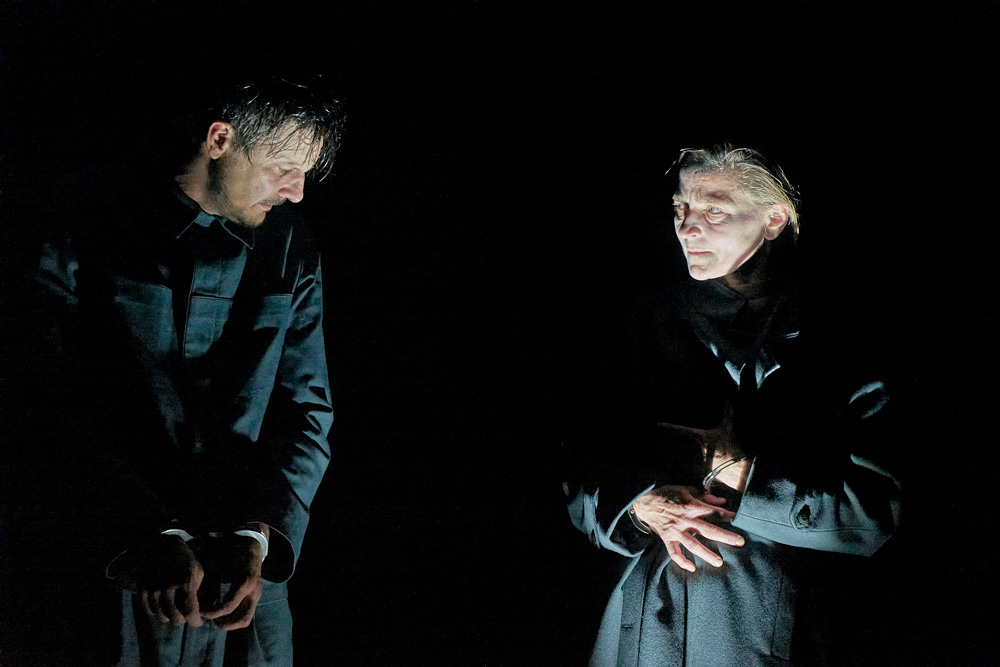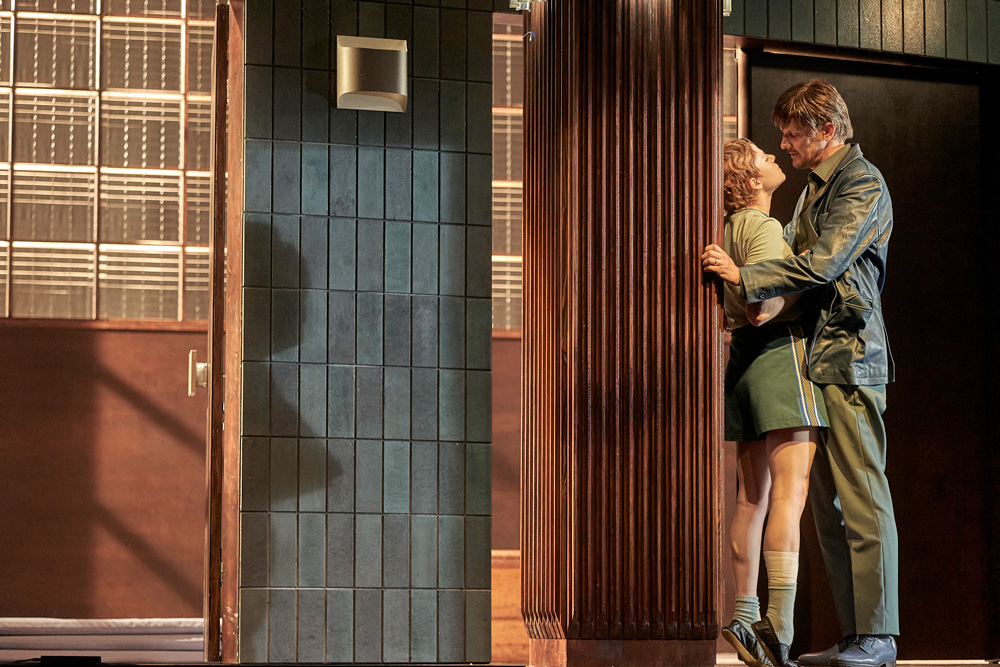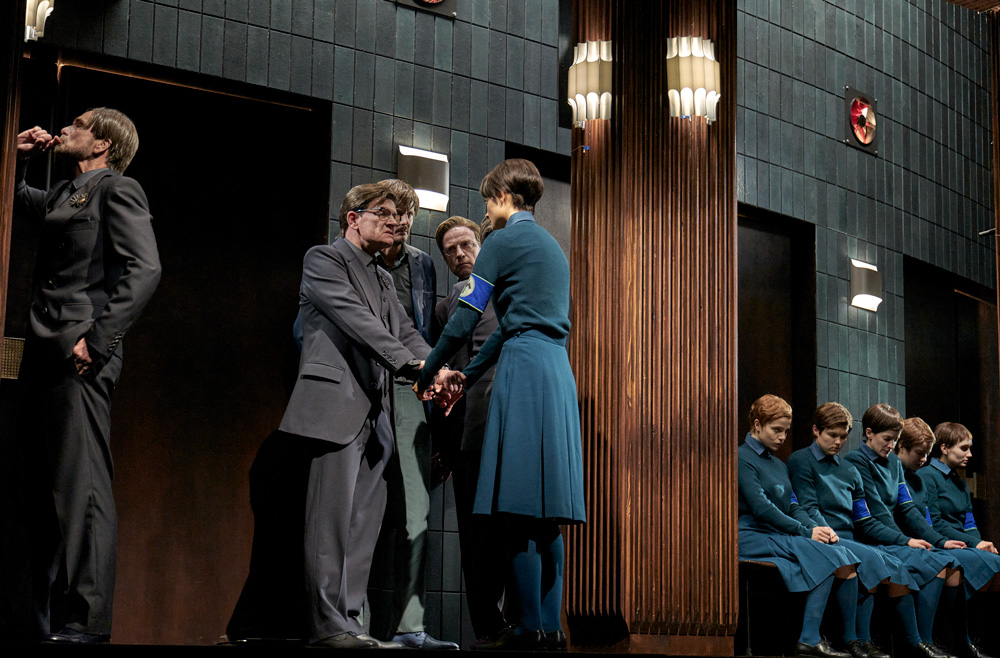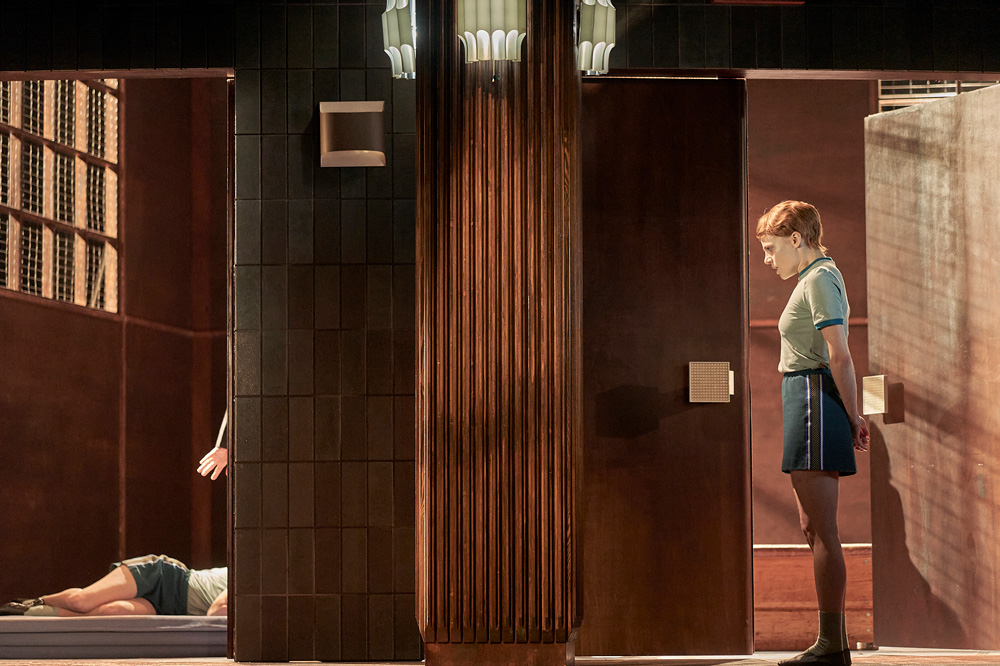Photo: Thomas Dashuber
Mateja Koležnik’s production of The Crucible (Hexenjagd) is currently being presented by the Berliner Ensemble. Tom Mustroph talks to the director about the political climate in Slovenia and why we now live in the digital Middle Ages.
Mateja Koležnik is sitting in the courtyard of Berliner Ensemble, shortly before her production of Arthur Miller’s The Crucible opens. It is raining and we sit under the umbrella of the coffee shop, which usually gives shelter against the sun. With pouring water around us, we launch into a conversation about making theatre in Germany, in the Balkans, and about the witch hunt that Miller describes and what it has to do with our times.
Tom Mustroph: You worked for a long time as a theatre director in Slovenia. Then you went to Austria and Germany. Now you are directing Arthur Miller’s The Crucible at the famous Berliner Ensemble. How does it feel for you, switching between cultures, between the Balkans and Western Europe? You once said, in Slovenia you are seen as a German director because of your strictness and your working ethics…
Mateja Koležnik: Yes, I am a Streber (German for smug, very hard working and overachieving student)…
TM: And in Germany you are seen as a person from the Balkans?
MK: Yes, a “Balkan shit,” because I am really into emotions. And I feel my Balkan side here. I am really happy here in Germany, because I like this culture, and the mindset this country has, very much.
TM: How would you describe this mindset?
MK: The people are into inhalt (the German word for content) and not into emotions. And it’s a relief for me and at the same time amazing, because whatever idea I have: if it is good, it is immediately recognized. And if it is not that good, it is recognized too. In our part of Europe, this is different. We can convince not with thoughts, but with emotions. If you have really strong emotions everybody will go [along] with that and with you. Here it’s more like: You have to know what you are telling, and not how you are telling it. It’s different.
TM: So here it is more mathematical, more scientific?
MK: It’s more about thinking: what is the idea? Why are you doing this? What do you want to tell? And with us it’s feelings, feelings, feelings, feelings all the time.
The Crucible at the Berliner Ensemble. Photo: Matthias Horn
TM: But I am not sure what might be better for the Arts: Thinking a lot before going ahead or just jumping into emotions?
MK: You know, today here in Berlin I’m thinking that it would be the best if I would be crazy as a dog in a disco and I would just go ahead without thinking because I have the feeling that I never dream my projects. I’m solving them from the first moment, I am saving them and trying to protect them and I’m thinking too much.
TM: That sounds sadly ‘Germanized.’ In Berlin you’re doing The Crucible by Arthur Miller. It was written during the time of McCarthyism, when there were show trials against communists and those who were labelled as communists…
MK: We know that kind of trials in Yugoslavia and post-Yugoslavia very well…
TM: But Miller set it the transition period between the witch hunts in the Middle Ages and beginning of the Enlightenment in thought and the beginning of capitalism in terms of the economy. So what triggered you first, when this play was proposed to you?
For me, when I when I was reading the play, I was thinking, we are so convinced in Europe that there never ever will come again the time when we will burn books. And we think that believing in witches belongs to the past. We have education now, we have science, and this will never happen again. But now we are having these vaccinated and un-vaccinated people and we are in the same situation again. The idiotism of society repeats itself.
TM: So you see Miller as an alarm bell? In this situation he describes there are strong similarities to social media today, where people are burned digitally. Do our new digital Middle Ages coincide very well with the play of Miller?
MK: You should not forget the way, those girls react [in the play]. At first, they start to lie a bit, and a bit more. And then they are getting power. For me the important part of the story is, what happens with the kids when they are getting too much power, when they learn how to manipulate, how easy this is.
And yes, generally speaking, this is exactly what I’m saying: We are living in a cyber Middle Ages now. It’s the same thing. We can trust in every stupid crazy idea without any ground, without any real proof. [If] I have an opinion, my opinion counts as science. What Miller wrote really well, is that people become animals, when they have a chance to be an animal. How easily we can lose this kind of moral integrity. It can go away in a second. I know that from the Balkans, how people can become beasts. It is just because they can.
TM: Because nobody cares?
MK: Because they are triggered so quickly and also because the punishment for that, for what you did, comes so late.
TM: The absence of a regulating system deepens the crisis?
MK: Exactly. I believe in one thing, that a person per se can be selfish and self-centered. That is ok. But society has to teach you to be different, to understand, that you are not alone with your desires and that you have to accept this. But today, let’s say for 20 years at least, every society is putting wood on the fire. It’s only me, me, me, my own wellbeing, my own chakras, my own needs and wishes. I would say today we are also without empathy, which is, I think, the main point.
TM: And that is valid for all, the rational Germans, and the emotional people of the Balkans?
MK: My experience today is, that you (Germans) still have some of that knowledge, that you belong to a society. We instead are just crazy.
TM: Does that also apply for Slovenia? I got to know it over a few visits as the most westernized country of the Balkan region, where institutions are respected, where people focus on education and work. It sometimes seems even like a better Germany, with all that concentration on getting things done better. So what you say now, surprises me really.
MK: Yes, it is true. We were very concerned with education and culture. But over the last two years with Janez Jansa, he’s very close to Viktor Orban. So, for me, it’s a surprise how the things fell apart in two years. Now we are living in a very oppressive and repressive system
TM: Is Slovenia really going in the Hungarian direction?
MK: Yeah, on a really fast train. He is using Corona to take civil rights away. It’s easy; it’s just the same as Bush could do after 9/11. He pushes us back.
TM: And is that also the case with theatre?
MK: Everywhere – mostly in media. He is killing systematically all the opposition. People fear for their jobs. It’s not a joke anymore.
 The Crucible at the Berliner Ensemble. Photo: Matthias Horn
The Crucible at the Berliner Ensemble. Photo: Matthias Horn
TM: You are lucky that some years ago you went to Germany and started working here.
MK: Yes, I am lucky.
TM: But you could still do some work in Slovenia?
MK: When I left 10 years ago, you could compare the budget for scenography, for costumes, to what you have here [in Germany], maybe a third less. But now, over these past 10 years, the amount of money you are getting for one performance is like 10 times less. We went from approximately 20,000 Euros to 2000 Euros.
TM: Is that because of political decisions or for economic reasons?
I would say for political reasons. Because if theatre is seen as relevant, then it has to have relevant budgets; the medium is so expensive, it has to be supported by the government. So the government has to have some kind of cultural politics. But we are in a transformation process. And this process started when we began to talk less about arts and more about culture.
TM: There are connections between arts and culture, I guess.
MK: Yes, but there has been a shift. Now we are talking about the culture of wellbeing, of eating well and taking care of your body. It means, that I in my petit-bourgeois life I have to see a lot of beautiful places, I have to rehearse a bit to stay fit, I have to meet my friends, have good wines with them, and here , and maybe I could see some theatre or art, and it’s better if it is not too heavy, but entertaining. And, slowly, everything that was art disappeared and what used to be performative art is now only entertainment.
For me art is not simple entertainment, it is a place where your head opens, and where there comes something that is not your own experience, but which is so strong it just blows your mind. For me, art is a tool to open people’s minds.
And in my country, we don’t talk about art anymore. We talk about culture and this is the culture of wellbeing. Everything has to be harmonized. So La Traviata, yes, because it has nice singing, but hard pieces, like Sarah Kane, nobody needs. For me theatre is a place, where you have to be confronted with different types of thinking, different views on the world. They are different, but plausible and believable. And you can understand that’s a different point of view. You listen to it. But now we are in a situation where people do not listen to each other, vaccinated or unvaccinated; they have their opinions, but they do not listen to each other. They are only shouting their own shit.
TM: If we agree that we are now in the new Middle Ages and that history repeats itself, how would a new renaissance, a new Enlightenment look?
MK: I think this is so far away that my life will end in the cyber-Middle Ages. I don’t believe that I will see the light of a new day.
TM: But could at least you imagine a kind of cyber-Enlightenment?
MK: You know, I was stupid, really. When this fourth industrial revolution came, I didn’t understand this, that every industrial revolution is changing society to the core. And I didn’t think about how we would change when we are living in the cyber world. I believed that we would keep the values and that Facebook or whatever was stupid and I didn’t predict what would happen. When we want to act, we always come too late. We are like Proctor in The Crucible.
TM: This gentle, intelligent farmer, whose only weakness is not to admit his affair with Abigail, one of the girls?
MK: Yes. He is maybe the closest to our mindset today. He has knowledge; he has a very strong feeling of society, he does not believe in witches at all. But he understands his rights as his privileges. He does not take responsibility for that what he does, he pushes things under the rug. And when he finally decides to act, when he tries to save something, then he is too late, like us, like the middle classes of Europe. We look down from above, on a lot of things, and we look too long.
When we parted from Yugoslavia, I knew that we had a chance to do something beautiful. And it’s my fault, the fault of my generation, that we were only focused on the things we liked to do. I was only in my work. I didn’t involve myself in how we are building society. Because I thought someone else would and then when I saw that stupid or corrupt people were leading my country, I mocked them because they were either stupid or corrupt. And I still didn’t get involved and now it is too late.
TM: I think that is also true with a certain age group in East Germany, my age group to be precise. Would you now like to be involved in society-building and politics or it is too late?
MK: It is too late. I would, but now I’m too old. The new generation has to do it and I will support them in a second, when I see them, but now in Slovenia, we don’t have a good alternative.
TM: I have read one thing you would like to do is direct a play by the Slovenian author Gregor Strnisa?
MK: Yes. It’s the same as The Crucible. When you have to criticize some political system and it’s too strong and it’s too rigid or too authoritarian, then you have to use a fairy tale or a myth or something similar.
Gregor Strnisa is an amazing poet who wrote the best critique of Yugoslavia in the 1950s, but he put it in the Middle Ages. When people were sitting in the audience at the premiere everybody knew that actually they were talking about contemporary life. Only the names of the politicians were different. I would like to do Strnisa, but we are Slovenians, and there is the problem of translation. In Slovenia, we do not have a good translation of Kleist. When I read it in German, I thought, this is so good. I do believe that Strnisa would be lost in translation too because it’s poetry.
TM: You would have to do it in Slovenia.
MK: Yes, if I can come back at all. But in this moment that is unfortunately impossible.
Tom Mustroph works in Berlin and Palermo as a freelance journalist and dramaturg. He operates in several journalistic fields, such as theatre, fine arts and sports. He is most interested in how self-responsible work can succeed elegantly and in accordance to minimal moral standards. He collaborates with several German language publications such as taz, FAZ, Neues Deutschland, NZZ, Theater der Zeit, zeit online, Deutschlandfunk and WDR.

